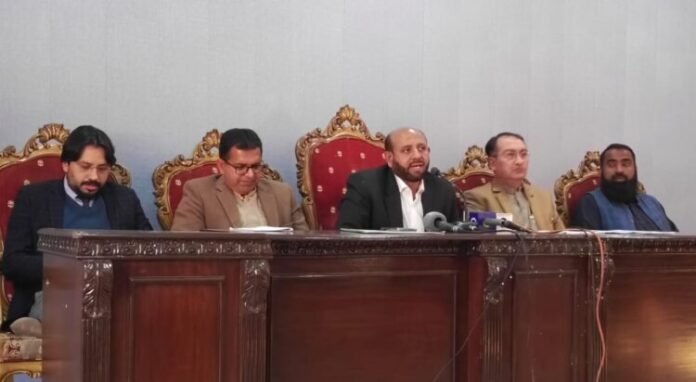ISLAMABAD: The Federation of All Pakistan Universities Academic Staff Association (FAPUASA) has strongly opposed the abolition of the 25% tax exemption for teachers and researchers, calling it a violation of parliamentary authority. The organization also raised concerns over government interference in university affairs, financial crises in various provinces, and the controversial appointment of bureaucrats as vice-chancellors. Additionally, FAPUASA condemned changes in pension and Leave Preparatory to Retirement (LPR) rules in Punjab, delays in faculty salary payments in Khyber Pakhtunkhwa and Balochistan, and the long-pending salary increase for Tenure Track System (TTS) teachers.
An emergency press conference was held at the Islamabad Press Club, attended by FAPUASA Central President Dr. Amjad Abbas Magsi, Central Vice President Dr. Mazhar Iqbal, Central General Secretary Dr. Muhammad Uzair, Central Information Secretary Dr. Ahtisham Ali, President of FAPUASA Islamabad Chapter Dr. Iqbal Jatoi, Dr. Muhammad Jadoon Khan from COMSATS University, and other officials.
Dr. Amjad Magsi condemned the Federal Board of Revenue’s (FBR) unilateral decision to abolish the 25% tax exemption for teachers and researchers, terming it a violation of the sanctity of Parliament. He emphasized that the tax rebate had been officially announced in the federal finance minister’s budget speech on June 28, 2024, and was part of the National Assembly’s proceedings and income tax manuals of 2022, 2023, and 2024. However, the sudden withdrawal by FBR contradicts the directives of the National Assembly and undermines parliamentary authority.
He warned that the abrupt abolition of the exemption in the middle of the financial year has caused frustration and anxiety among teachers and researchers, ultimately affecting their efficiency. Dr. Magsi also stated that FAPUASA had formally written to the Finance Minister regarding this issue but had yet to receive a positive response. He asserted that FAPUASA reserves the right to stage peaceful nationwide protests. He further highlighted that FBR has failed to implement decisions made by the Federal Tax Ombudsman, which previously ruled in favor of the 25% tax rebate for teachers and researchers. The President of Pakistan had also rejected FBR’s stance, and the Peshawar High Court ruled in favor of university teachers in March 2024. Additionally, the Tax Ombudsman reaffirmed this decision in January 2025.
Dr. Magsi demanded that the Prime Minister immediately withdraw the unconstitutional FBR directives and halt unjust tax deductions, respecting the supremacy of Parliament and the Constitution.
Support for FAPUASA Sindh Chapter Protests
Dr. Magsi expressed full support for the FAPUASA Sindh Chapter’s ongoing protests against the provincial government’s attempt to appoint bureaucrats as vice-chancellors. He strongly condemned the remarks made by the Chief Minister of Sindh, who justified this decision by alleging corruption among VCs. Dr. Magsi stated that universities are academic institutions responsible for awarding bachelor’s, master’s, and Ph.D. degrees, and it is unacceptable for a non-PhD holder to oversee academic councils, syndicates, and selection boards.
He criticized the government’s disregard for the Higher Education Commission (HEC), which sets the criteria for vice-chancellor appointments. He further highlighted that an educational boycott is ongoing in all Sindh universities, yet the provincial government has not shown any willingness to resolve the crisis.
FAPUASA called on President Asif Ali Zardari and PPP Chairman Bilawal Bhutto Zardari to accept the teachers’ legitimate demands, restore the old appointment criteria for vice-chancellors, and resolve the crisis immediately.
Opposition to Pension and Leave Rule Changes in Punjab
The FAPUASA leadership condemned the recent changes in pension and Leave Preparatory to Retirement (LPR) rules in Punjab, calling them “anti-employee.” They stated that employees who have dedicated their lives to government service are now being deprived of their pension and other rightful benefits. The leadership warned that these financial deprivations would negatively impact employee performance and demanded that the Punjab government restore the old pension system, LPR, and leave encashment policies while ensuring university autonomy and adequate funding.
Concerns Over University Autonomy in Khyber Pakhtunkhwa
FAPUASA General Secretary Dr. Muhammad Uzair strongly condemned the Khyber Pakhtunkhwa government’s violations of the Universities Act. He stated that vice-chancellors are unable to advertise faculty positions without approval from the provincial secretary, which undermines university autonomy. Additionally, several universities in the province are facing severe financial crises, with delays in salary payments to faculty and staff.
He demanded an end to political and bureaucratic interference in universities and called on the government to ensure timely payment of salaries and uphold university independence.
Financial Crisis in Balochistan’s Universities
FAPUASA also raised concerns about the severe financial crisis in Balochistan’s universities, where teachers and employees are struggling with unpaid salaries. The association urged the Balochistan government and the Higher Education Commission to take immediate measures to resolve salary disbursement issues and safeguard university autonomy.
Demand for TTS Salary Increase
The leadership demanded an increase in the salaries of Tenure Track System (TTS) teachers, a long-pending issue since 2021.
Nationwide Protest Announced
Amid the ongoing crisis in universities across all provinces and the federal capital, FAPUASA announced a nationwide Black Day to be observed in universities on Thursday, January 30, 2025. Additionally, FAPUASA confirmed its participation in a protest organized by the All Government Employees Grand Alliance (AGEGA) and the Punjab Professors and Lecturers Association (PPLA) in front of the Parliament House in Islamabad on February 11, 2025.
Final Call for Government Intervention
Concluding the press conference, the FAPUASA leadership urged the President of Pakistan, the Prime Minister, the Federal Finance Minister, and the Chief Ministers of all four provinces to play an active role in resolving the financial and administrative challenges faced by universities. They emphasized the urgency of addressing these issues to alleviate teachers’ concerns and enable them to perform their duties effectively.




